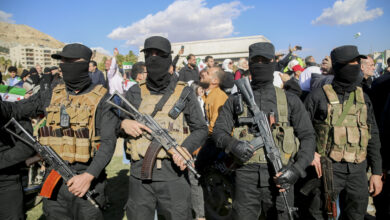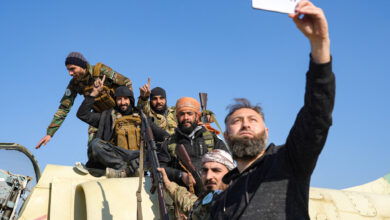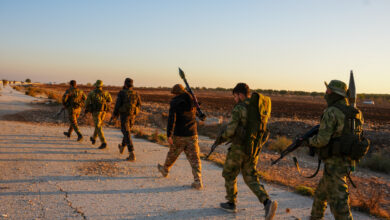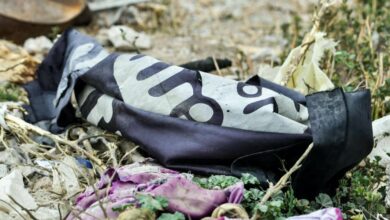US citizen ISIS member wants to know why he can’t go home
Kosovar-American Lirim Sulejmani traveled with his family to Syria to live under ISIS. Now in an SDF prison, he recalled the allure of the group’s propaganda
HASAKAH, Syria – Lirim Sulejmani limped over a green steel threshold, his gnarled toes bare on the filthy concrete. An orange jumpsuit, inside-out, was draped over his emaciated shoulders.
When the Kosovo-native was 23, he found refuge in the United States after fleeing a genocidal regime. Sixteen years later, he decided to join one.
Sulejmani is one of hundreds of American citizens believed to have joined Islamic State in Iraq and Syria since 2014. But as the Trump administration transfers dozens of high-priority ISIS suspects from makeshift prisons across northeast Syria as U.S. troops levels draw down, he is beginning to fear he may have been left behind.
Forced to fight Turkey’s invasion on their own after U.S. troops withdrew to the eastern oilfields, the Syrian Democratic Forces says it is scarcely able to supply and guard the jails.
And the Syrian government, notorious for swift and blind executions of Islamists, has already sent troops into the northeast to fill the gap of withdrawing American forces.
Now, though he insists he committed no crime, Sulejmani is beginning to fear for his future.
Like most of the 5,000 suspected ISIS fighters crammed into the prison near Hasakah, he surrendered to the SDF during ISIS’s final stand at Baghuz, in eastern Syria near the Iraq border, in early 2019.
He was then separated from his wife and children, questioned by U.S. Special Forces and has since been interrogated twice by the FBI, who told him that he would be extradited to the United States.
A Department of State spokesperson told The Defense Post: “The situations of U.S. citizens or possible U.S. citizens in Syria are by definition extremely complicated. Absent written authorization from the individual, we cannot share details about individual cases with the media.”
“I asked to be deported to Kosovo, because it’s a small country,” he told The Defense Post in a prison holding room last week.
“If there’s a jail, from any point to the border in Kosovo – from one border to the other border is not more than 200 km.”
After a moment he added, “I thought that might make it easier for my wife to visit.”
U.S. authorities declined, he claims. “They said no, ‘The State Department wants you, and we’re gonna give you over,’” along with his wife and children.
But that was seven months ago.
‘I wanted to live in an Islamic country’
How Sulejmani found himself in this mess is difficult to reconstruct. As he weaves through recollections, his memories are selectively attuned to his own misfortunes on the losing side of a war.

After coming to the U.S. in 1999, he said he met and married a woman in Chicago. But their first child died following the 2008 recession, as he recalls, so they moved to Canada – where Lirim said he found religion.
“I was not religious,” he said. “My wife was more religious than I was,” his eyes darting to the ski-masked guards.
Sulejmani insisted he did not know his wife’s nationality, but has previously said she was of Polish descent. The Defense Post was unable to locate a Polish-American woman in detention camps for women linked to ISIS.
His decision to traffick his wife and two infant children, Aisha and Muhammad, across three countries and into an active war zone was “very spontaneous,” he recalled. “I wanted to live in an Islamic country.”
The pseudo-caliphate was a natural choice. Asked why an established conservative Islamic country – like Saudi Arabia, for example – was not a better option, he said moving there would have been laden with bureaucracy.
Besides, Islamic State’s propaganda was alluring. Sulejmani recalled a calling upon doctors and engineers to make hijra, or to immigrate, to the self-proclaimed Islamic State from around the world.
“I watched this video, they said we’ll give you housing, free electricity,” he said. “It just sounded very nice.”
Sulejmani denied he ever watched videos of violence or beheadings. “I was too weak for that,” he said. But he was aware of them.
“They did not scare me. It’s a form of punishment under Sharia,” he said, “because of the crimes they commit.”
Asked what crimes humanitarian workers and journalists like Brit Alan Henning and fellow American Steven Sotloff were guilty of, he looked down at his hands. “I’m not a judge.”
Like many others in the Hasakah prison, Sulejmani insisted that he did not go to Syria seeking violence or wives, and claims he never personally knew anybody who kept slaves, “But we heard about it.”
In retrospect his plan seemed simple. With a background in civil engineering from the University of Illinois, Chicago, perhaps he could help build the caliphate’s buildings, he said.
“Somebody has to rebuild something. It was a war,” he said.
Sulejmani found a window to his fantasy on the internet. “People told me how happy they were” under ISIS. “They loved it.”
“You get a lot of sins just by living in the Western world.”
In November 2015, he said, he brought his wife and two children – Aisha, then four years old, and Muhammad, then not yet two – to Kosovo. From there they flew to Turkey. A smuggler delivered them from Gaziantep to a remote spot the Syrian border late one night.
“See that fire? Just walk there,” he recalled the smuggler saying. “They were Turkish soldiers. They had a fire.”
The troops searched him and found $500, he said. “Once they took the money, it’s like they didn’t care. They got their pay day. They told us to go.”
He and his family walked until they were met by a member of Islamic State.
That is where Sulejmani account begins to blur. Four years later, with scores of friends dead and his family lost in an internment camp, he says his decision was clearly a mistake.
He said he was sent immediately to Mosul, handed a Kalashnikov and given a month of military training.
Yet Sulejmani thoroughly denied during the hour-long interview that he was a fighter, and insisted he was exempt because he was married. “Others fell in love with the gun,” he said, but he simply came to enjoy Sharia law with his family.
Sulejmani could not explain how he earned money, claiming to have been unable to find work for three years. Still, he was nostalgic for the “very nice brothers” who he said would give him handouts to feed his family.
“They would help you for the sake of Allah, nothing else,” he said.
“They would just put their hand in their pocket. Somebody gave me $400, somebody $100. That’s how I survived. I could never work.”
Fighters, he said, got an extra $50 per month. “I never got that. I had some money I brought with me and when that ran out, I had to worry about food.”
But he admits he carried the same weapon for three years, shifting from Mosul to Manbij, then to Raqqa, near active fronts working rabat, or armed overwatch.
Sulejmani insists he never fired a shot in combat – only 20 bullets during training at one at a ceiling, accidentally – and claims he frequently carried an unloaded weapon.
As Coalition airstrikes pulverized Raqqa in 2017, Sulejmani said he began to feel “betrayed.” ISIS commanders were hoarding food, he said, and his son fell ill. Those who tried to escape were tortured.
As the U.S.-led Coalition-backed SDF swept across the landscape, he withdrew, hitchhiking with his wife and kids deeper into the shrinking caliphate.
ISIS commanders, he claims, kept people in the dark.
“Pretty much the same thing the Western world does. One form of controlling people is fear.”
Where the Caliphate’s leadership went, Sulejmani went as well, crossing the Euprhates river to al-Mayadin, then back again, preferring to face Coalition bombing over the advancing Syrian Army.
Bombarded from all sides, the Sulejmani recalled the final towns of the Caliphate in rote order: Hajin, Kishman, Shaafa and finally, Baghuz, where, hungry and facing death, he packed his family in a van to drive towards the advancing enemy as part of a humanitarian corridor.
For all the suffering inflicted by the Islamic State, Suleyjmani seemed unconcerned with any but his own.
“When you become religious, this world doesn’t mean much to you,” he said.
“We’re all in this room are going to die at some point. It matters what’s to come. Because this will end. But what’s to come is going to be forever.”
“If you’re not one of those who make it to paradise, then you end up in hell. And that is forever.”
Joanne Stocker contributed reporting from Hasakah, Syria.












